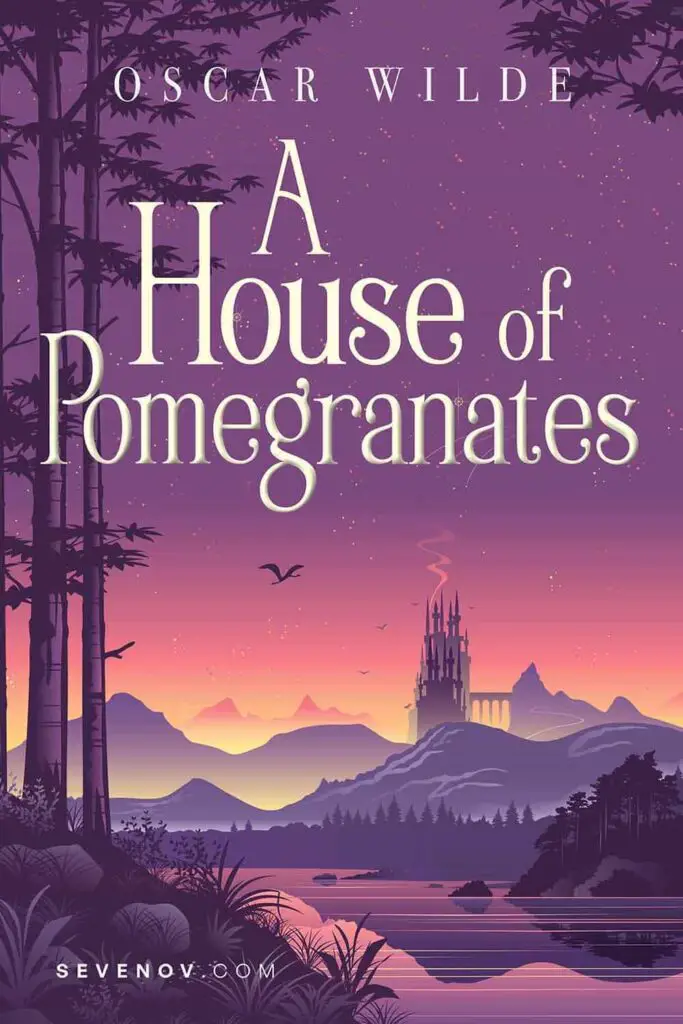
A House of Pomegranates by Oscar Wilde
Author: Oscar Wilde
Published: 1891
Genre: Short Story Collection
A House of Pomegranates is a collection of fairy tales written by Oscar Wilde, published in 1891. A House of Pomegranates is Wilde’s second fairy-tale anthology, published after his very first, The Happy Prince and Other Tales.
1. Synopsis of A House of Pomegranates
A House of Pomegranates features four fairy tales, including ‘The Young King,’ ‘The Birthday of the Infanta,’ ‘The Fisherman and His Soul,’ and ‘The Star-child.’ In each story in A House of Pomegranates, Wilde creates a unique world with vivid imagery and colorful characters. Through these stories, he explores themes such as beauty, love, sacrifice, and vanity. Each tale is filled with magic and wonders that captivates young and old readers. This article will introduce the various stories in A House of Pomegranates.
2. The Young King
The illegitimate shepherd, the son of a recently deceased king’s daughter from an unspecified nation, is the subject of the story of “The Young King.” The sixteen-year-old, the sole heir, is brought to the palace to prepare for his coronation. There, astounded by the beauty of his new house, he waits impatiently for the delivery of his new crown, scepter, and robe so that he can be crowned the following day.
He experiences three nightmares during the night, one for each piece of his attire, each one revealing the origins and methods of acquisition. The first dream depicts a mob of malnourished, ragged peasants, including children, weaving his robe while receiving little compensation or food despite their arduous labor.
The second dream depicts a group of slaves on a ship, the youngest of whom has wax poured into his nose and ears before being sent below to search for pearls for the young king’s scepter. However, he perishes just after discovering the best pearl. The third dream is the most complex and centers on the origin of the rubies in his new crown.
In it, men work in a tropical jungle, mining a dry riverbed as the god of Death approaches the goddess Avarice and asks for a single grain of her corn. Death summons Ague, Fever, and Plague to kill one-third of Avarice’s acolytes each time she refuses, leaving the area lifeless. Avarice flees in terror, while Death departs to attend to his responsibilities due to global famine and conflict.
On the day of his coronation, the Young King rejects the attire presented to him and instead fashions a crown out of a loop of dried briars, a scepter out of his shepherd’s stick, and a tunic out of tattered cloth in its place. While on his journey to the cathedral, the peasants and the aristocrats criticize him for denying them work and attempting to alleviate the world’s suffering.
The Young King pays no heed to the admonishment, choosing to make his way to the cathedral’s altar alone. As he prays, his staff-scepter blooms with pearly white lilies, his dried briar crown with ruby-red flowers, and the sunshine streaming through the stained glass windows drape his robe in golden light.
People prostrate down in worship, rioting noblemen kneel and pledge homage to him, and the astounded bishop proclaims that a far higher being (God) has legally crowned the young king.
Find out more about “The Young King.”
3. The Birthday of the Infanta
A dwarf with a hunchback has been discovered in the woods by the Spanish King’s courtiers. To celebrate the Infanta’s (the king’s daughter) twelfth birthday, the father of the hunchback sells him to the palace for her entertainment.
The dwarf performance is one of the numerous celebrations planned to honor her birthday, the only occasion she can interact with other youth. The dwarf dances while oblivious to the audience’s laughter, just as he did in the woods. She demands a second performance after supper.
The dwarf misjudges the Infanta’s supposed affection for him and sets off to find her, traveling through a garden where the flowers, fish, and sundial make fun of him, but the birds and lizards do not. He finds his way inside the palace and wanders through the chambers, looking for the Infanta, but all of them are empty.
He eventually finds a hideous creature in one of the rooms that imitate his every action. He breaks down and falls to the ground crying when he realizes it is his reflection. He knows the Infanta does not love him and is laughing due to his ugly appearance.
The Infanta and the other kids stumble upon the sobbing dwarf. Thinking it to be another performance, they laugh and applaud. The dwarf’s flailing weakens and eventually stops. A servant tries to awaken the dwarf when the Infanta requests more entertainment, only to find that he has passed away from a broken heart. She tells the Infanta this, and the Infanta replies with the story’s ending line, “For the future, let those who come to play with me have no hearts.”
Find out more about “The Birthday of the Infanta.”
4. The Fisherman and His Soul
A young fisherman meets a mermaid but cannot marry her since people with souls cannot survive underwater. When he visits his priest, the priest informs him that the soulless mermen are lost and that his soul is his most valuable possession. When he tries to sell it to businesspeople, they tell him it is worthless.
He visits a witch, who informs him that his soul is his shadow and explains how, after dancing with her, it can be removed using a knife made of snakeskin.
After severing the connection between his body and shadow, the Soul warns him that the world is unkind and begs to take his heart with him to soothe his concerns. The Fisherman sends the Soul away and reunites with the Mermaid under the water but refuses to give his heart to the Soul because his love requires it. The Soul tells the Fisherman that it will visit him every year.
Every year, the Soul travels to different places, meets new people from far-off civilizations, and acquires a miraculous item each time. However, the Fisherman treasures love more than anything his Soul has tried to seduce him with.
In the first year, the Soul begins by tempting the Fisherman with the Mirror of Wisdom, which is revered as a “God” in the East, but the Fisherman rejects it as he values love more than wisdom. In the second year, the Soul tempts the Fisherman with the Ring of Riches, which was given to the Soul by an Emperor who would have been willing to give up his whole treasury for it had the Soul not survived all of his attacks. The Fisherman again refuses it as he treasures love more than riches.
In the third year, the Soul tells the Fisherman of a nearby city where a woman dances barefoot. The Soul reminds the Fisherman that the Mermaid cannot dance since she has no feet. He decides to accompany the Soul to see the woman dance since it is near, and he can quickly return to the Mermaid. He and his Soul are reunited when he emerges from the ocean.
The Soul instructs the Fisherman to do several things as they pass through cities: in the first, to steal a silver cup; in the second, to beat a kid; and in the third, to kill and plunder the man in whose home they were guests. The Fisherman realizes the Soul has become evil. When the Fisherman confronts the Soul, it is pointed out that he has not given the Soul a heart. The Fisherman tries to separate the Soul from himself once more but realizes that they can never be separated once they are linked.
The Fisherman erects a shelter near the ocean and goes to the shore, calling the Mermaid daily, but she never turns up. Years later, the dead body of the Mermaid washes up on the coast. The Fisherman cradles her while the waves undulate around them.
When the priest discovers the drowned Fisherman holding the dead Mermaid, he declares them cursed and has them interred in an unmarked tomb at a field’s edge where no sweet herbs grow. He refuses to bless the water as he had intended. Three years later, the priest arrives at the altar draped in flowers, preparing to preach on God’s terrible anger but cannot do so for unknown reasons, so he instead talks of God’s love.
When he inquires about the origin of the flowers on the altar, the deacons reply that they originated from a corner of the field. The mermen relocate to a different bay after the priest blesses the water the following day, but the flowers never blossom again.
Find out more about “The Fisherman and His Soul.”
5. The Star-Child
A poor woodcutter discovers a baby boy abandoned in the woods and takes him in after feeling sorry for him. He grows up to be an incredibly attractive man, ruthless, conceited, and haughty, thinking of himself as the celestial Star-child. He commands/governs the other children, who obey him unquestioningly, and enjoys tormenting the village beggars and the woodland animals.
A beggar woman wanders into the community one day, looking for her missing son, who happens to be the Star-child himself. She is malnourished, haggard, and has bleeding feet. He scorns and sends her away, but as a result, he is punished by turning into a repulsive hybrid of a toad and a snake.
When his supporters desert him, he leaves to ask his mother for forgiveness. Additionally, he begs the animals he mistreated for forgiveness.
Finally, he reaches a city where he is taken prisoner and enslaved. He is mistreated by his evil sorcerer master, who assigns him three missions to accomplish. He first gives him a mission to locate some hidden white gold in the woods. All day long, the Star-child looks for it without success.
On his way back to the city, he stops to rescue a rabbit caught in a trap. The rabbit graciously reveals where the white gold is hidden to the Star-child, and he gratefully takes the gold. When he returns with the gold, a sickly leper calls out, warning him that he will undoubtedly starve if he doesn’t give him money for food. He receives the gold piece from the Star-child, and the sorcerer withholds food and drinks for the night.
He is instructed to search the woodland for a piece of yellow gold for the second mission. Once more, the leper meets him at the gate, the rabbit leads him to where it is, and the Star-Child hands the leper the gold. He is beaten by the sorcerer and then bound.
The last mission is to locate a hidden chunk of red gold or face death in his master’s hands. He finds the gold after the rabbit reveals where it is buried and returns to the city. On the way, he runs across the leper again and decides it means more to the leper than himself. He gives the leper the gold.
Upon his arrival, the crowd waits to anoint him as the new king according to the prophecy. He finds the city’s Queen and King to be his mother, the beggar woman, and his father, the leper he had given the gold pieces. He is forgiven and restored to his originally handsome self as well.
In addition to reuniting with his parents, the Star-Child banishes the evil sorcerer, bestows wealth on the woodcutter and his family, and provides food and clothes for those in need. The king who succeeded him was harsh and evil, and the end of the story informs us that his gentle, loving, and benevolent rule only lasted for three years.
Find out more about “The Star-Child.”




